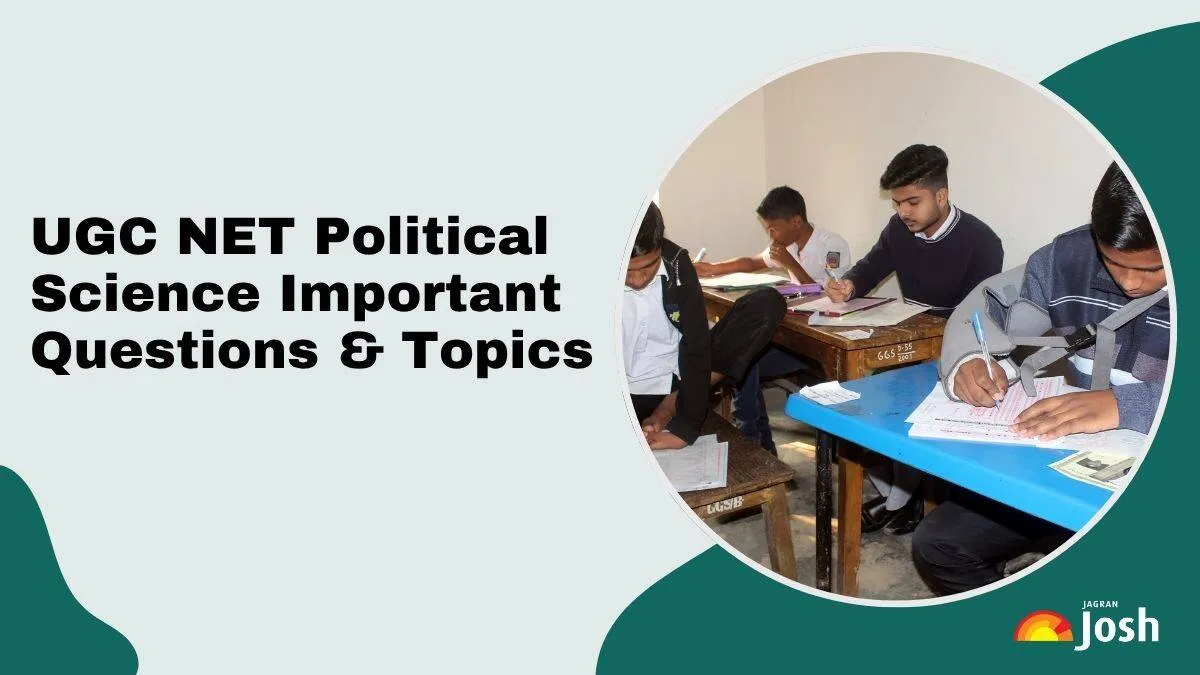The National Testing Agency (NTA) will conduct the UGC NET June 2025 exam from June 25 to 29 to determine candidates' eligibility for the posts of Assistant Professor and Junior Research Fellowship (JRF). As per the official schedule, the UGC NET Political Science exam is set to be held on June 26 in the evening shift: 3 PM to 6 PM. Aspirants aiming to qualify for these positions in the field of Political Science are advised to thoroughly practice important questions. Being well-versed with important questions and frequently asked topics will boost your confidence and improve your chances of clearing the exam. In this article, we’ve listed some of the most important UGC NET Political Science questions and topics to help you give your best shot!
UGC NET Political Science Important Topics
To reap the maximum benefits of their preparation, candidates should focus on important topics frequently asked in UGC NET previous year papers. These include Political Theories, Indian Political Thought, Western Political Thought, Public Administration, and International Relations. Giving extra attention to these topics can help you secure higher marks and improve your chances of qualifying for JRF and Assistant Professor roles.
- Political Theory
- Political Thought
- Indian Political Thought
- Comparative Political Analysis
- International Relations
- India’s Foreign Policy
- Political Institutions in India
- Political Processes in India
- Public Administration
- Governance and Public Policy in India
UGC NET Political Science Important Questions
As per the UGC NET previous year papers, the following are a few important questions that you cannot afford to miss. Reviewing the topics associated with these questions will provide better clarity and help you tackle related questions that may be asked.
Question 1: Who founded the ‘Mexican Socialist Workers’ Party’ which was later named ‘Mexican Communist Party’?
A. Jaya Prakash Narayan
B. B.R. Ambedkar
C. M.N. Roy
D. Lenin
Answer: C) M.N. Roy
Question 2: The participatory democracy idea originated with
A. Karl Marks
B. Aristotle
C. Rousseau
D. None of the above
Answer: C) Rousseau
Question 3: Which one of the following books are not written by Karl Marx?
A. The Communist Manifesto
B. Wage Labour and Capital
C. Das Kapital
D. The Wretched of the Earth
Answer: D. The Wretched of the Earth
Question 4: What are the key aspects of the theory of Utilitarianism?
A. Aggregationism
B. Partiality
C. Minimise utility
D. Deontological
Answer: A. Aggregationism
Question 5: Who differentiated between antagonistic and non-antagonistic contradictions?
A. Marx
B. Lenin
C. Mao
D. M.N. Roy
Answer: C. Mao
Question 6: For Savarkar, what were the three fundamental bonds that united the Hindus?
A. Territory, Race, Culture.
B. Territory, Population, Sovereignty.
C. Territory, Government and International Recognition.
D. None of the above.
Answer: A. Territory, Race, Culture
Question 7: Who coined the famous acronym "POSDCORB"?
A. Henry Fayol
B. Mary P. Follett
C. Gulick and Urwick
D. Frederick Taylor
Answer: C. Gulick and Urwick
Question 8: Who among the following referred to the Constituent Assembly of India as a 'Microcosm in action'?
A. B. R. Ambedkar
B. Granville Austin
C. Rajni Kothari
D. Rajendra Prasad
Answer: B. Granville Austin
Question 9: Who among the following dependency theorists added the concept of 'Semi-Periphery'?
A. Raul Prebisch
B. Andre Gunder Frank
C. Henrique Fernando Cardoso
D. Immanuel Wallerstein
Answer: D. Immanuel Wallerstein
Question 10: In which aspect does Modern Liberalism NOT believe?
A. Social liberalism
B. Positive freedom
C. Cradle to grave welfare
D. Minimal state
Answer: D. Minimal state
